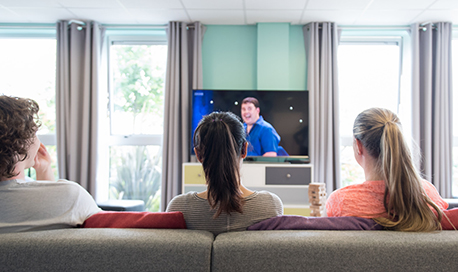For most of us sitting at home under lockdown, scanning social media and news websites has become a constant accompaniment to our real jobs as we squeeze into spare bedrooms and sit at requisitioned kitchen tables. Cut off as we are from everyone else and confined to home, the media has become the conduit through which we experience this particular crisis. Few of us will see the hospitals dealing with thousands of COVID-19 patients first hand, nor will we know we have even had the virus until we are tested for antibodies many months from now, if we are even tested at all. We will see a police car scanning the streets, we will queue to go into a food shop, but for many the closest we will come to touching a threat we cannot see, feel, hear or smell will be through our laptops, phones and TV screens.
In Britain this crisis began with an information vacuum as the public clamoured for guidance, and eventually the government introduced daily press briefings to the Lobby, the group of politics reporters accredited for access to senior politicians and government. Because the people with the most information about the virus and the power to combat it are politicians, in Britain at least there has been a tendency to view the virus and its response through a fundamentally political lens, meaning a slide towards genres of reporting focused on the runners and riders and the specific actions or statements of politicians as if this were a general election and not a global event. At press conferences we have seen journalists with no expertise in health being tasked with asking questions of politicians and public health officials, and much of the content we end up with focuses not on the virus itself, but rather on servicing reporters with enough quotes and material to fill space. As we now know though, COVID-19 is more complex than a soundbite. It kills some but leaves others untouched, it is highly contagious, and yet we may not know we have caught it until it is too late. Ultimately, it breeds fear and paranoia and leaves us searching for answers.
Viral media
Into this fertile vacuum comes a new viral threat which capitalises on the lack of certainty about what is going on: clickbait. The media scholar Henry Jenkins coined the maxim “if it doesn’t spread, it’s dead,” based on the observation that web media mimics viral behaviour by needing to constantly expand and be reshared or die out. The explosion in articles on Coronavirus has been caused by people’s insatiable demand for Corona content, and thanks to SEO, or search engine optimisation, by digital publishers, all are trying to push their work as high up the Google rankings as possible.
We sit trapped at home glued to our screens, feasting on viral content and giving it new life. As a consequence, it is now easier than ever for disinformation to make it into our consciousness through these same pathways. Some click -hungry conservative news sites in the US have been pushing the idea that COVID-19 is in fact a Chinese made bioweapon to bring down the economy, while internet conspiracy theorists are having a field day as they trade theories about why borders have really been closed and return to the widespread misconception that Covid-19 is merely another round of flu. Meanwhile professional media outlets announce downsizing, furloughing and layoffs as owners try to save money in an already rationalised industry, further increasing reliance on clicks and dubious headlines.
Why we need a global journalism
As borders and lockdowns keep as apart, however, the virus is also a rare opportunity to tell stories in the media that tie the world together. We all know the world is interconnected, but we struggle to integrate this interconnectedness into our news coverage.
Pandemics, like climate change, are human universals which promote mutual self-interest – whether we like it or not we are all cosmopolitan now by necessity. Accepting what globalisation has created is the only way to deal with its problems. Several of the students on my Global Journalism module at Queen Margaret University have chosen to use COVID-19 as a way to look at the larger issues at play beyond the virus itself, such as how we respond to mass employment, what the drops in carbon emissions from lockdowns mean for our ability to slash carbon long term, and the implications and challenges of mass uptake of digital working.
Many have been saying that this is now a time to rethink our economic system; how we organise work, how we travel, and how we live. Now is also the time to reinvent journalism too, and to realise that beating viral media needs investment, but also that it is out in the world, not the political lobby, that we can find the answers we seek.







